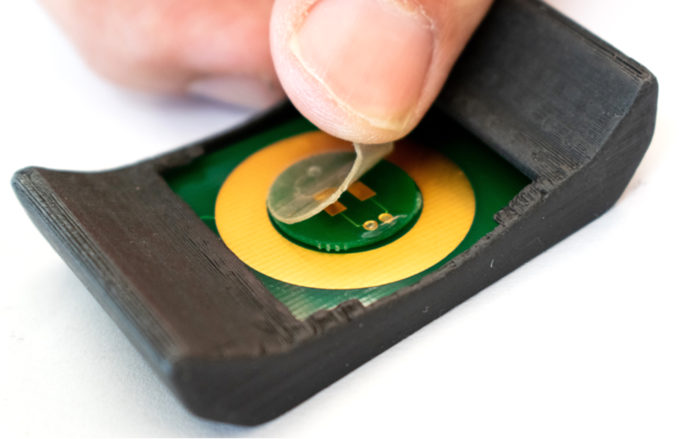UCLA announced a couple of health care-related developments last month that had little to do with the Covid-19 pandemic.
First, engineers at the UCLA Samueli School of Engineering published a study in Science Advances, a peer-reviewed scientific journal, detailing their design of a thin adhesive film that could turn a smartwatch into an advanced health and body monitoring system.
Currently, smartwatches can track basic body measures, such as heart rate and sleep patterns; soon, several brands will also be able to track blood pressure. But they are not yet able to track more complex indicators, such as concentrations of key nutrients or metabolic indicators. For those, blood samples remain the key testing method.
UCLA engineering researchers developed a disposable, double-sided film that attaches to the underside of a smartwatch. The film can detect molecules such as metabolites and certain nutrients that are present in body sweat in tiny amounts. That allows for the tracking of key health and metabolic indicators, such as glucose and lactate.
The side of the adhesive film that touches the skin collects and analyzes the chemical makeup of droplets of sweat. The watch-facing side turns those chemical signals into electrical ones that can be processed and displayed on the smartwatch.
“The inspiration for this work came from recognizing that we already have more than 100 million smartwatches and other wearable tech sold worldwide that have powerful data-collection, computation and transmission capabilities,” said study leader Sam Emaminejad, an assistant professor of electrical and computer engineering at the Samueli School of Engineering.
“Now we have come up with a solution to upgrade these wearables into health-monitoring platforms, enabling them to measure molecular-level information so that they give us a much deeper understanding of what’s happening inside our body in real time,” he added.
These researchers join a growing number of labs and companies racing to develop advanced body monitoring devices. One such company is Santa Monica-based BioStrap USA, which has developed a wearable monitor that uses sensor straps to track what’s going on several layers under the skin and deeper inside the body. BioStrap has been targeting the physical fitness market.
Unlike BioStrap, which is a separate product, Emaminejad’s team is developing an add-on that can be attached to an existing smartwatch or Fitbit device.
In another development, UCLA Health and the university’s urology department on June 29 launched a telehealth cancer genetics program that provides rapid access to genetic testing and counseling in an effort to help identify people who have inherited genes for cancers of the genital and urinary systems.
The program focuses on diagnosing hereditary kidney, bladder, testicular and prostate cancers. The aim is to complement and expand on the work of researchers and providers at the UCLA Jonsson Comprehensive Cancer Center.
To assist in providing genetic counselors and clinical testing experts, UCLA Health has teamed up with Genome Medical Inc., a South San Francisco-based company providing clinical genetic experts for employers, health systems and medical providers.
According to the announcement from UCLA Health, there is a national shortage of genetic counselors. In recent years, the number of companies and health care providers offering genetic testing and counseling services has exploded as genetic testing technology has become cheaper and more advanced.
“By offering telehealth genetic counseling, genetic risk assessment can be performed efficiently and accurately,” program lead Brian Shuch said in the announcement.
Shuch, an associate professor of urology at the David Geffen School of Medicine at UCLA and a researcher at the UCLA Jonsson Comprehensive Cancer Center, added, “We hope this model can be adopted by other oncology providers within UCLA Health that are struggling to meet the increasing demand for genetic risk assessment.”

